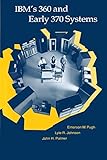- R. Hodeson, Crystal Fire (on the invention of the transistor), http://amzn.to/1RictfF
- T.R. Reid, The Chip (on the IC), http://amzn.to/1Hdbu8w
- E.W. Pugh, IBM's 360 and Early 370 Systems, (on the evolution of computer architecture), http://amzn.to/1NKZcWQ
Also, as others have mentioned, Soul of a New Machine is awesome.
I feel like you may be asking about computer science, though, not computer hardware. If so, pickings are slim. Two that stand out are:
- S. Rosenberg, Dreaming in Code, http://amzn.to/1HdbJk1 (Not really a history of code, just the history of a single project)
- M. Campbell-Kelly, From Airline Reservations to Sonic the Hedgehog, http://amzn.to/1RicYpS (which, while not quite as amazing as the others, is the only history of the software industry as a whole I know of.)

Yes; IBM System 360/370, for example, was a marvel of engineering and design, with a remarkable history [1]; so were the first microprocessors, such as MOS Technology's 6502 [2]. The best part was, you could know all of it, if you wanted, down to the transistor level - the geek's Holy Grail. With modern chips/systems you cannot any longer, not even with the Raspberry Pi.
I wish IBM's revolutionary architecture lived on in our PCs; good engineering pays off, and today's software could be more sane, as people would be learning from the giants rather than wasting time on a massive scale trying to reinvent the wheel.
[1] https://www.amazon.com/IBMs-Early-Systems-History-Computing/...
[2] http://visual6502.org/